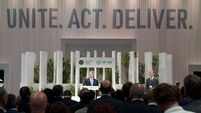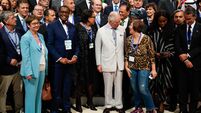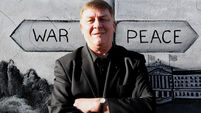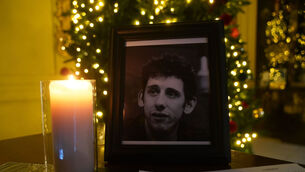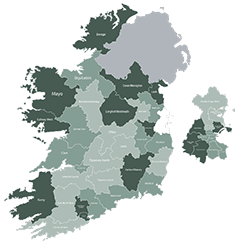Five things that happened on day two of Cop28

Britain's King Charles speaks with British Prime Minister Rishi Sunak as they attend the opening ceremony of the World Climate Action Summit at Cop28 in Dubai.
Here is what happened on Friday at the UN's climate change summit in Dubai, Cop28:
The UK prime minister has been sharply criticised by environmental activists and scientists for his government's watering down of its emissions targets in the coming years.
Cynics have pointed out that it is a political gambit aimed at shoring up Conservative Party support ahead of a general election by pandering to motorists and the oil and gas industry alike.
Mr Sunak has in recent months eased off on timelines for phasing out petrol and diesel cars, while major licences have been granted for the years ahead for fossil fuel exploration.
He doubled down at Cop28, claiming climate policies can only work if they benefit the British people and that the UK is merely a 1% overall emitter to global emissions.
By contrast, Britain's King Charles told the Cop28 audience that much more must be done.
"I pray with all my heart that Cop28 will be a critical turning point towards genuine transformational action. The hope of the world rests on the decisions you must take," he said.
“We are taking the natural world outside balanced norms and limits and into dangerous uncharted territory. We are carrying out a vast frightening experiment of changing every ecological condition all at once, at a pace that far outstrips nature's ability to cope."
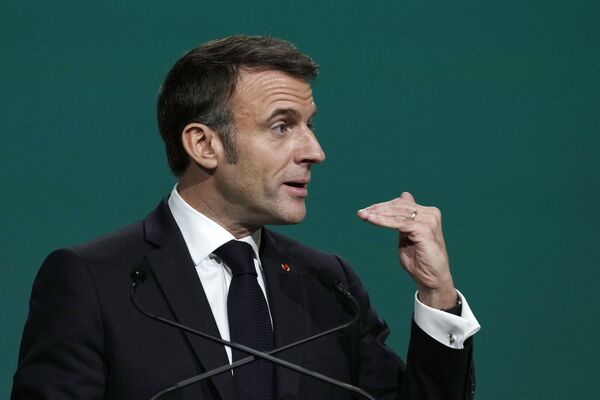
Taoiseach Leo Varadkar will have to wait until tomorrow to speak but today, European Commission president Ursula von der Leyen, French president Emmanuel Macron, and Indian president Narendra Modi spoke.
India has been accused of being among the world's major polluters. Mr Modi proposed India to host the Cop event in 2028.
He claimed: "India has walked the talk on climate action", as he defended his country. He added: "India has presented an excellent example of the balance between ecology and economy before the world.
"Despite India being home to 17% of the population of the world, its contribution to global carbon emissions is less than 4%."
Ms von der Leyen said global emissions must peak by 2025, adding that world leaders must phase out fossil fuels and reduce methane emissions.
The words "phasing out" and "phasing down" have become one of the biggest bones of contention as countries try to come to a consensus.
Many fossil fuel producers have insisted that "phasing out" language is unacceptable, while environmental scientists and activists say phasing out is essential, and that phasing down is simply not enough.
Leaders of smaller countries, the real victims of a warming planet, have told their counterparts of the dangers they face due to climate change.
President of the Seychelles, Wavel John Charles Ramkalawan, president of the Seychelles, said he was disheartened that many climate finance commitments are yet to be fulfilled even as the climate crisis intensifies.
"Small island developing states are on the frontline of climate change,” he said, and they urgently need money to tackle the fallout.
Smaller countries typically bear the brunt of climate change despite emitting miniscule carbon emissions compared to richer countries.
President of Iraq, Abdul Latif Rashid, warned that rivers in his country are now under threat from drought linked to climate change.
“The drought in the south of Iraq, the record level temperatures, desertification, and sand storms have led to economic challenges that resulted in a larger level of poverty and internal displacement," he said.
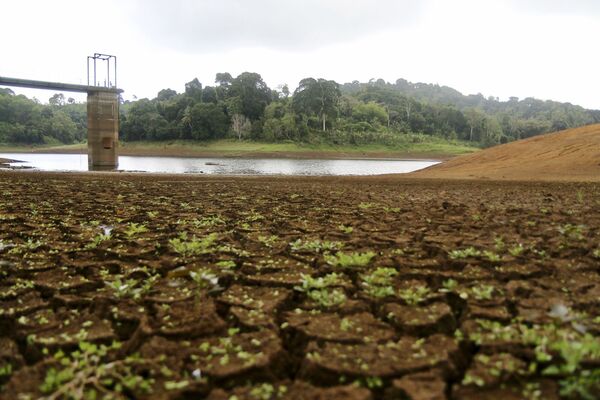
The UN Convention to Combat Desertification said 630,000 km2, roughly the combined area of Italy and Poland, was impacted by drought in 2022 as it experienced its hottest summer and second warmest year on record - almost four times the average 167,000 km2 impacted between 2000 and 2022.
It is 500 years since Europe last experienced a drought as bad as in 2022, the report said.
It is 78 years since drought conditions were as severe as they were in the La Plata basin of Brazil–Argentina in 2022, reducing crop production and affecting global crop markets.
There is an 80% expected increase in drought intensity in China by 2100.
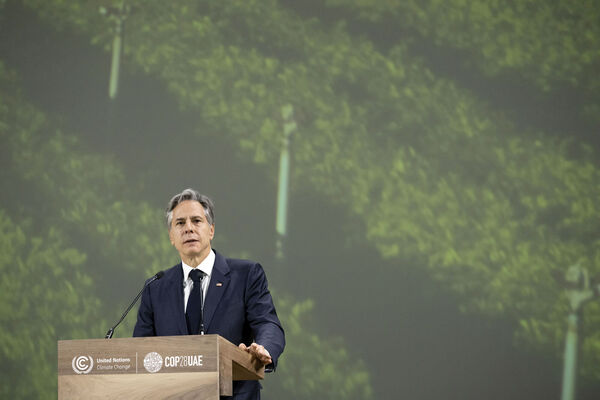
The Cop28 UAE Declaration on Sustainable Agriculture, Resilient Food Systems, and Climate Action affirms that "agriculture and food systems must urgently adapt and transform in order to respond to the imperatives of climate change".
However, the lack of binding commitments has led to charges that such an agreement, while encouraging at face value, could become yet another vacuous policy with little real-world meaning.
Senior researcher for Third World Network, Lim Li Ching, said: “It’s encouraging to see that food systems are finally taking their place at the heart of climate negotiations and at the highest levels of government.
"We cannot meet our global climate goals without urgent action to transform the industrial food system, which is responsible for one-third of greenhouse gas emissions and 15% of fossil fuel use.
ActionAid Ireland CEO, Karol Balfe, said industrial agriculture, and its role in driving deforestation and factory farming of livestock, is the second largest source of global greenhouse gas emissions, largely due to its reliance on fossil-fuelled fertilisers.
“At the same time, agriculture is the sector most vulnerable to climate impacts. As corporations have taken control over our most basic human needs, the world’s food systems have become complicit in their own destruction,” she said.
Ms Balfe said the announcement is “a missed opportunity to take the bull by the horns when it comes to agriculture".
SUSTAINABILITY & CLIMATE
Check out our Sustainability and Climate Change Hub where you will find the latest news, features, opinions and analysis on this topic from across the various Irish Examiner topic desks and their team of specialist writers and columnists.
